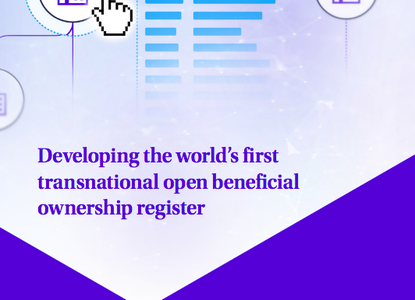Early impacts of public beneficial ownership registers: Ukraine
Help us understand how you are making use of resources from the Open Ownership website by filling out this short survey
Publication type
Case study
Publication
Country focus
Ukraine
Sections
Impact
Open Ownership Principles
Access
Summary
Please note that this impact story was researched and written before the war in Ukraine
In 2015, Ukraine became the first country in the world to launch a public register of the beneficial owners of corporate entities registered in the country. This report provides an overview of the register’s origins and evolution, then explores its impact. It finds that Ukraine’s open register has enabled organisations outside the government to evaluate the quality of the register’s data, to reach insights that support the country’s anti-corruption agenda, to add value for the private sector, and to provide greater oversight of the extractive industry.
Ukraine’s experience also exemplifies the importance of making beneficial ownership data public, in line with the recommendation set out in the Open Ownership Principles for Effective Beneficial Ownership Disclosure. Public access is key for widespread third-party use of data beyond authorities, which, as Ukraine’s experience shows, can help drive up data quality and increase impact.
Public data, despite its accuracy limitations, can help anti-corruption activists shine light on relationships and pathways of influence. Further work on verification will help to ensure that Ukraine’s register, the Unified State Register of Legal Entities, Individual Entrepreneurs, and Civic Formations, is a better reflection of the true nature of ownership and control in Ukraine’s economy.
Impact
- Ukraine’s experience demonstrates that an iterative approach to legislation and implementation can strengthen and expand a beneficial ownership transparency regime over time.
- Civil society can play an active role in auditing beneficial ownership data quality.
- Work by organisations fighting corruption in Ukraine has shown that it is often the integration of multiple public datasets that deliver greatest value and impact, for example, combining beneficial ownership data with data on politically exposed persons.
- Anti-corruption analyses using Ukrainian beneficial ownership data show how 100% accurate beneficial ownership data is not always required in order to establish enough relatedness between entities to suggest that they are not independent of one another and merit investigation.
- At the same time, significant quality issues in Ukraine’s beneficial ownership platform and data show how these issues limit the data’s utility.
- Momentum on full implementation and verification of beneficial ownership data must be regained after the conflict has ended if Ukraine’s ambitious commitment to beneficial ownership transparency is to deliver its intended policy impact.



